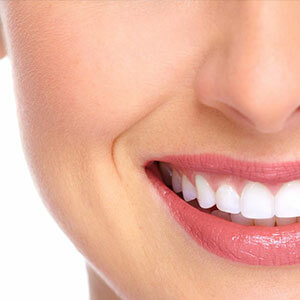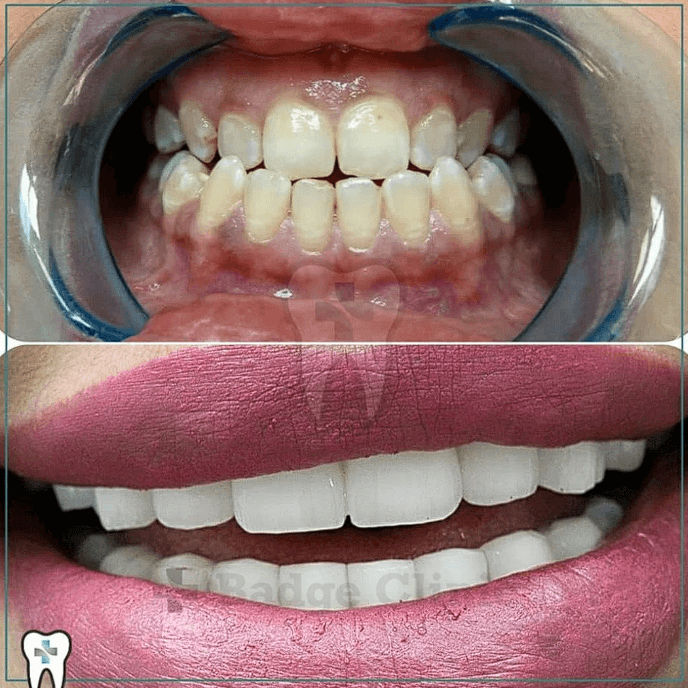Dental veneers, also known as porcelain veneers or dental porcelain laminates, are ultra-thin, custom-made shells crafted from materials that are the same color as your teeth. These shells are affixed to the front surface of teeth to enhance their appearance. Serving as a versatile cosmetic solution, veneers can address issues such as discoloration, chips, or irregular spacing between teeth. They are customized to seamlessly blend with natural teeth, creating a harmonious and natural-looking smile. Made from durable ceramic or porcelain, veneers not only enhance aesthetics but also provide protection to vulnerable teeth. Our dental veneers procedure offers you the opportunity to achieve a confident and radiant smile by altering the color, size, shape, or length of your teeth. At Badge Clinic, our cosmetic dentistry includes veneers and transformative procedures for confident, restored teeth. Concerned about your smile? Contact our experts for a free consultation.
We’ll get back to you within one business day (via e-mail & WhatsApp)
Our Turkey veneers procedure at the Badge Clinic is a widely preferred, especially by tourists seeking a beautiful smile. This cosmetic dentistry solution proves exceptional, particularly for individuals uncomfortable with issues like cracked, chipped, or stained teeth. The benefits of dental veneers extend beyond aesthetic enhancements, encompassing practical advantages such as:




Dental veneers typically come in two main types: porcelain and resin composite. Porcelain veneers exhibit superior stain resistance and closely resemble the light-reflecting qualities of natural teeth.
Crafted from dental ceramic, porcelain veneers are thin, custom-made shells designed to snugly fit the front surface of teeth. Exceptionally durable and resistant to stains, they authentically mimic the natural appearance of teeth. Although they necessitate some enamel removal and are considered a permanent treatment, their long-lasting aesthetic benefits make them a popular choice.
Composite veneers consist of tooth-colored composite resin directly applied and sculpted onto teeth. This affordable, non-invasive alternative to porcelain veneers is suitable for minor cosmetic enhancements. However, they may be more prone to staining and have a shorter lifespan compared to porcelain veneers.
During your consultation for Turkey veneers, we will explore the available options, discussing which type best suits your needs. As each individual is unique, the choice of veneers and their quantity will vary, allowing us to create a personalized treatment plan based on your specific goals.
When evaluating the expenses associated with veneers in Turkey versus the UK, a noticeable difference often emerges. Veneer procedures in Turkey generally come with a more budget-friendly price tag, attributed to factors like lower labor and operational costs. While considering the cost of veneers in Turkey is vital, selecting a cosmetic dentist of high repute is equally crucial. At Badge Clinic, our medical team is renowned for delivering top-quality cosmetic procedures, characterized by expertise and outstanding results.
During your consultation, the specific costs of your Turkey veneers procedure will be thoroughly discussed, ensuring a transparent and affordable treatment package. We believe that the combined cost of veneers at Badge Clinic, complemented by 5-star accommodation and VIP transfers, offers a cost-effective solution, allowing you to achieve the brand-new smile you’ve always envisioned.



Badge Clinic stands out as the premier choice for dental veneers in Turkey, earning a stellar reputation for delivering outstanding dental services and results. Our highly skilled and experienced dental professionals specialize in providing top-notch veneers, ensuring you leave with a naturally enhanced smile. Witness the impressive transformations in the images below and explore our extensive gallery featuring various cosmetic surgeries, from rhinoplasty in Turkey surgery to our transformative liposuction procedure.
Prioritizing a deep understanding of your unique goals, we craft personalized treatment plans and execute procedures with advanced techniques in state-of-the-art facilities. Your safety is paramount, as we exclusively conduct our dental veneers in Turkey procedures in internationally certified hospitals. Enjoy a comfortable stay and recovery in 5-star hotel accommodation before returning home with your revitalized smile.
The consultation stage at Badge Clinic is pivotal for discussing your dental condition and determining if dental veneers align with your needs. Our commitment to delivering optimal results means that if veneers may not be the most suitable option for you, we’ll explore alternative recommendations. Our expertise extends beyond veneers to encompass various cosmetic dentistry procedures, including gum contouring for enhancing gum shape and overall smiles, along with teeth whitening to address discoloration concerns. Our ultimate goal is to empower you with a confident smile. Schedule a consultation today to explore the possibilities and plan your next steps with treatment at Badge Clinic.


A prosthodontic consultation is crucial for assessing the required number of veneers or whether they are the best option for you. Ideally, an even number of veneers, such as two, four, eight, ten, or twelve, yields optimal aesthetic results. This aspect will be thoroughly discussed during your consultation, considering the Turkey veneer cost based on the quantity needed. A personalized treatment package, accommodating both your needs and budget, can be tailored accordingly.
Following your surgery for dental veneers in Turkey, maintaining proper oral hygiene is paramount. Brushing twice daily for two minutes, daily flossing, and using a bite guard at night for veneer protection are recommended. Avoiding very hard foods helps prevent potential damage. Our medical team provides comprehensive aftercare instructions to ensure optimal maintenance.
While veneers offer durability, they aren’t permanent. With proper care, you can anticipate a lifespan of 10-15 years. Cosmetic repairs may be necessary to sustain their aesthetic appeal. Natural wear, dietary considerations, and accidents are factors we can address in repairs. To prolong veneer life, refrain from activities that could damage natural teeth, such as biting into very hard foods, and minimize staining risks from beverages like coffee, wine, or tea by using a straw or consuming in moderation.
Understanding the recovery process is essential. After getting veneers, the initial recovery involves adapting to the new dental enhancements. We will provide detailed information on post-procedure care, potential discomfort, and any temporary adjustments needed. Typically, the recovery is swift, and you can resume your normal activities shortly after the procedure.